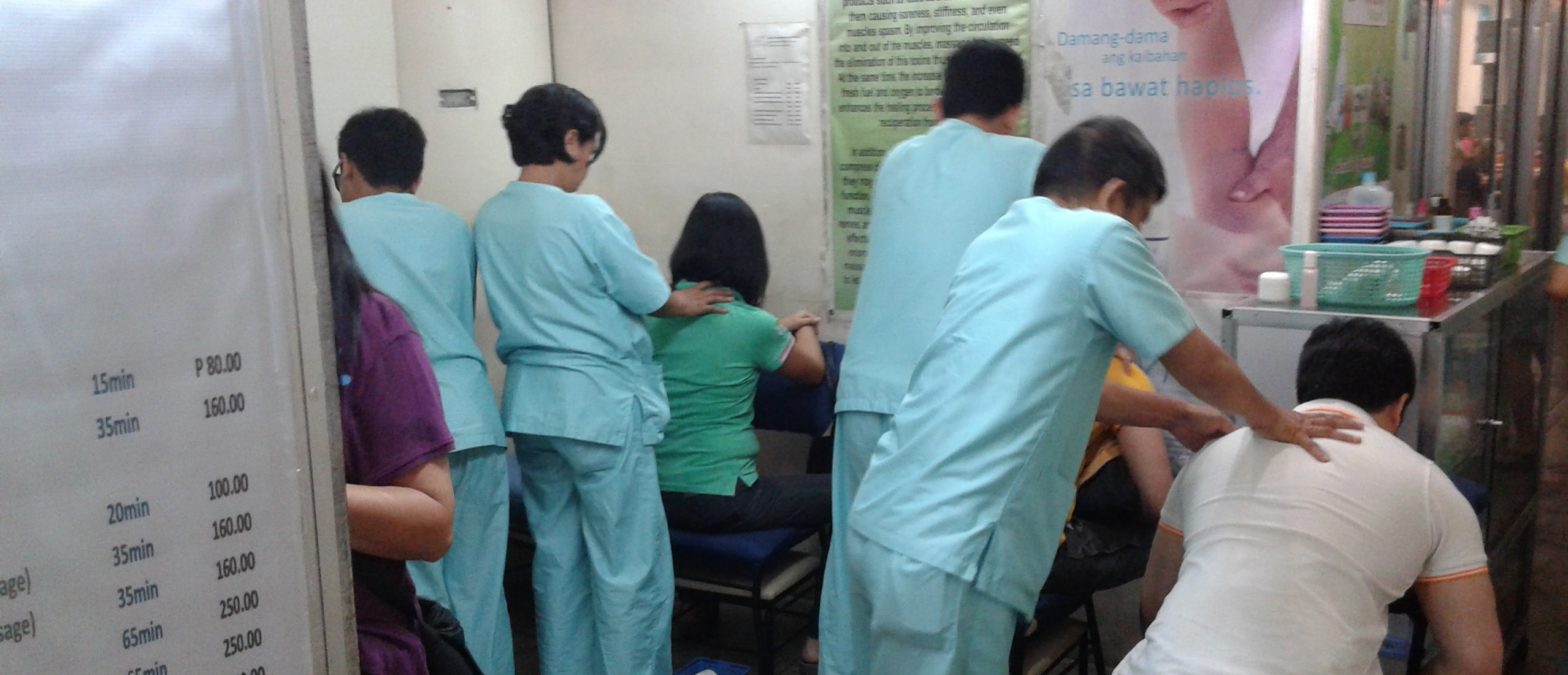
By JAKE SORIANO
IN December last year, blind massage therapists from Zamboanga City traveled all the way to Cagayan de Oro to undergo licensing exams.
They took the nearly 500-km journey because their jobs were on the line. But Typhoon Ruby (Hagupit) struck, and they were told to go home.
No exams meant no licenses. Now they are in danger of losing their jobs because an administrative order on licensing issued by the Department of Health (DOH) way back in 2010 is now in force.
DOH Administrative Order No. 2010-0034 imposes a blanket licensing requirement for all wanting to be massage therapists, whether blind or sighted.
The intentions may be good but advocates call it a violation of the law and protest its implications for thousands who are blind and without adequate livelihood opportunities, and who look to massage therapy as their source of income.
“Yung mga therapist, nangangamba po sila (Blind massage therapists are worried),” Jojo Maraguinot of the Zamboanga City-based Vision Impaired Society Towards Advancement Inc. told VERA Files in an interview.
According to the administrative order (AO), no license means no job. But to secure that license, one needed first to enroll in a DOH-accredited training center. That training would of course cost them money.
“They are afraid na bukas makalawa, wala na silang trabaho (They are afraid of losing their jobs),” he explained. “Yung iba na natatakot talaga, naghanap ng paraan. Nag-resort sila sa lending, nalubog sa utang (There were some who incurred debts just to be able to secure their licenses).”
Costly training, inaccessible centers
Signed by former Health Secretary Enrique Ona in December 2010, AO No. 2010-0034 aims to “improve the quality of health service delivery of governing massage facilities providing massage services.”
To achieve that goal, the department imposed a sweeping requirement on all persons wanting to become massage therapists to secure licenses first. They are to undergo a two-part examination, a theoretical test and then, should they pass this, a practical test.
But before one can even apply for the exam, certain qualifications have to be met, most notably having a certificate of training from a DOH-accredited training provider, where they are expected to learn about the basics of massage therapy, as well as anatomy, physiology and microbiology.
Maraguinot said this set-up already creates problems, particularly for the marginalized blind people whomay not be in a position to apply for a license.
“In Mindanao, tuition alone costs P8,500 or more,” he raised, adding that a massage therapist is lucky to have an income of P3,500 a month.
There is as well the issue of availability and accessibility of training and exam centers. Accredited trainers come all the way from Davao City, and applicants wait for slots in other cities in order to take the exam, which is what happened to those who traveled to Cagayan de Oro.
The health department order sets only one day in June and another day in December as examination dates, except in extraordinary cases.
“Not everyone can comply with the order, especially the unschooled and the marginalized,” explained Maraguinot.
“Threatening siya sa livelihood. Instead na matulungan iyong mga blind … ma-discourage na sila kasi high expense na siya eh (It really threatens livelihood opportunities for the blind. Instead of helping them become massage therapists, it might be a deterrent because of the expenses involved),” he said.
Full implementation in 2015
The licensing requirement was issued in 2010 and was to take effect in January 2011, but Dr. Josephine Hipolito of the DOH Committee of Examiners for Massage Therapy (CEMT), said the lack of licensed massage therapists (LMT) back then made them defer its implementation.
“Because most of the spas did not have LMTs yet, we have issued a resolution to have a transition period of until December 2014 for compliance with the said AO.”
The order is now set for full implementation this year.
It “applies to all who desire to practice the profession, whether sighted or blind, college graduates, high school graduates or those who have not entered schooling but in the massage industry for more than five years,” Hipolito said.
CEMT has the power to issue, as well as deny or cancel, licenses to massage therapists. It is also tasked to investigate complaints against massage therapists, and accredits institutions or massage trainers.
The country now has 8,900 LMTs while 5,600 more are undergoing examinations, Hipolito said.
Thousands of blind massage therapists, however, may just lose their jobs, said PWD leader Ronnel del Rio, calling the DOH order a violation of Presidential Decree No. 856 or the Code on Sanitation of the Philippines.
“The violation has resulted in several abuses of the department and one of them is the threat to more than 5,000 Filipino blind massage therapists,” noted del Rio, who is a United Nations Economic and Social Commission for Asia and the Pacific (UN ESCAP) Promoter for Making the Right Real for PWDs.
He instead proposed the recall of the AO and the “re-strategizing (of) measures on how to improve the practice of massage therapy in the Philippines.”
Blind massage therapists should have representatives in DOH committees that formulate policies on the practice, del Rio said.
“Massage therapy is the number one income generating opportunity for Filipino blind, hence, our concerns and issues must be part of the total regulation of the industry.”
Equalize playing field
In support of blind massage therapists, AGAP Partylist Rep. Rico B. Geron filed last November House Resolution No. 1691 urging the DOH to exempt from the order those from the sector provided they are legitimate members of cooperatives.
“DOH deliberately deprived the blind massage therapists their right to a decent occupation,” the resolution read.
The same document also said while blind massage therapists would like to comply with the DOH directive, “they cannot, because it requires that only sighted individuals can act in accordance with the said order.”
The DOH, Hipolito said, has no objection to the House resolution.
“However, we would like to raise the issue on who will be liable or accountable if and when these blind therapists would encounter untoward incidents,” she said, adding that “there will always be the first time.”
“We have been receiving complaints such as ‘namaga ang tagiliran ng minasahe (a swelling in the massaged area),’ ‘nasunog ang likod ng kliyente (a burn in a client’s back),’ ‘umusli ang buto sa likod ng kliyente, (a dislocated bone on the back),” the DOH official said.
Further noting that the ultimate goal of the DOH is public health and safety, Hipolito asked that the House resolution include “the person/ s or entity who will be liable/ accountable for the blind’s actions in order to fully support the blind.”
For both Maraguinot and del Rio, however, the heart of the issue is not regulation but social protection for the blind.
Maraguinot called the licensing requirement “beneficial” in terms of professionalizing the massage therapy industry, but added that that the government should also consider the plight of the marginalized by providing subsidies.
“The government has to provide support so the process is not that costly for the blind,” Maraguinot said.
For his part, del Rio said that blind massage therapists are “not against regulation. We are requesting for the equalization of the playing field.”
A House inquiry on the issue is tentatively set at the end of the month, according to del Rio. Blind therapists are also considering filing a case questioning the order before the Supreme Court in March, he added.


